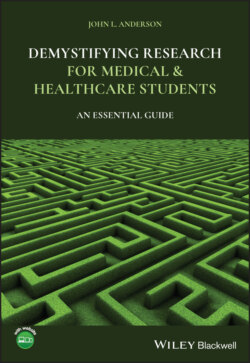Читать книгу Demystifying Research for Medical and Healthcare Students - John L. Anderson - Страница 25
Epistemology
ОглавлениеEpistemology is the study of what constitutes ‘knowledge’. It is concerned with defining the nature of what knowledge is and how we know things. So, the epistemologist will be concerned about different views on knowledge, beliefs, truth, justification, and internalism/externalism. (Don't even ask!)
In relation to research methods, if you hold a positivist belief (note my use of the term ‘belief’) then you are likely to want to have proof for your knowledge in the form of things you can see, touch, and get confirmation from others that they see and touch them too. You are likely then to favour methods which measure things and count things and to use statistics to analyse your data. One criticism is that they reduce everything to a number:
Nrs:
What's your depression like today?
Ptnt:
It's a seven.
Nrs:
Oh my, that's bad, I'd better get you some more pills!
If you hold an interpretivist belief, then you will not search for absolute proof for your knowledge, because you don't think that that exists. Therefore, you will be inclined to use inductive methods and qualitative approaches, because you recognise the subjectivity of your unique location in time (history) and society (class, gender, race, culture, etc.). You won't try to measure pain, or depression just by numbers. You might say ask questions like:
Nrs:
Can you describe your pain to me?
A third paradigm (way of thinking) is a pragmatist belief. This accepts aspects of both positivist and interpretivist beliefs and can adapt to the most realistic means of addressing an issue using either positivist or interpretivist approaches.
